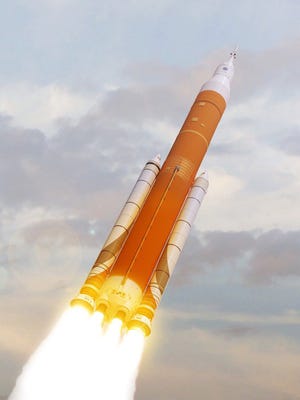NASA won't fly astronauts on first SLS rocket launch
 James Dean
James Dean
CAPE CANAVERAL, Fla. — NASA and the White House have decided it would be too risky and expensive to launch astronauts on the first flight of a new exploration rocket, likely pushing the system's first launch of a crew from Kennedy Space Center until at least 2022.
The decision followed a feasibility study that the Trump administration requested. The White House asked NASA if it could accelerate the new exploration system's first launch of a crew that was not expected before 2021.
“The risk was reasonable, but it was additional risk,” Bill Gerstenmaier, head of human spaceflight programs at NASA, said Friday.
The study determined that a 322-foot Space Launch System rocket and Orion capsule might be ready to fly astronauts by the early 2020 — if NASA received an extra $600 million to $900 million.
► April:New spacesuit years from ready despite $200M investment
► February:NASA urged to be cautious on flying crew on first space launch rocket
Instead, the space agency will stick with its existing plan, which hopes to see the test flight called Exploration Mission-1 blast off from Kennedy Space Center’s pad 39B in 2019.
The next mission, Exploration Mission-2, aims to fly astronauts in orbit around the moon roughly 2½ years later using an upgraded version of the SLS rocket equipped with a more powerful upper stage.
“The best plan we have is actually the plan we’re on right now,” Gerstenmaier said.
Follow James Dean on Twitter: @flatoday_jdean